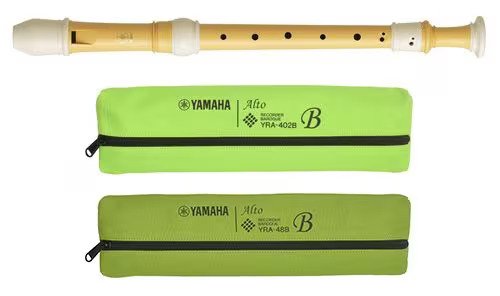Manufacturer's Description

Materials that are gentle on the environment
Bodies made of Biomass material UNITIKA “TERRAMAC®” plastic: the world’s first application* of environmentally friendly plant based materials in a musical instrument. * As a musical instruments commercially available, according to our own research in June 2014.
Improved instrument performance
The change in material has resulted in a mellow, centered tone that is similar to that of wood recorders, plus improved breath response and high-register control.
Newly adopted plant-like colours
Bright colors chosen to elicit the image of plants such as corn and others have been used in the recorders and cases for the first time.

“TERRAMAC® ” plant-derived plastic
TERRAMAC® is an environmentally friendly material made by using proprietary technology from UNITIKA LTD. to combine polylactic acid (PLA)* with other materials and then improve and mold the result.Currently, it is widely used in products ranging from food containers to components for electronic devices.Yamaha uses TERRAMAC® in recorders, retaining the same durability, strength, and appearance as conventional ABS resin while reducing CO2 emissions. Yamaha is contributing to the development of a more sustainable society by working to prevent global warming and reduce consumption of chemical resources at the same time as we manufacture high-quality musical instruments.
*Polylactic acid (PLA): Polylactic acid is a biomass-derived resin made from lactic acid produced by fermenting sugar from plants. It produces much less CO2 than other plastics when burnt, and since the plants it is made from absorb CO2 from the atmosphere as they grow, it significantly reduces the C02 emissions that are thought to cause global warming. Polylactic acid has a heat of combustion of one-half to one-third that of petroleum-based plastics, and of course, does not emit toxic gases such as dioxin or hydrogen chloride when incinerated.
Why is plant-based plastic gentle on the environment?
1. Reduced CO2 emissions
Plants grow by absorbing CO2 that would otherwise add to the global warming problem. Even though plant-based plastic results in the same CO2 emissions as other materials during manufacture, use, and disposal, the total amount of CO2 produced is reduced by the amount absorbed during growth.
2. Reduced use of oil
Oil is the main raw material used in plastics, but reserves are limited and will be depleted in the not-so-distant future. By replacing a portion of the raw material requirements with plant-based materials the total amount of oil used can be reduced, thereby prolonging the availability of fossil resources.
Certified as Yamaha Eco-Products
 Plant-based Plastic Recorders are certified as Yamaha Eco-Products, which is a certification established by Yamaha for products that meet the standards of “Product Environmental Quality Objectives”.
Plant-based Plastic Recorders are certified as Yamaha Eco-Products, which is a certification established by Yamaha for products that meet the standards of “Product Environmental Quality Objectives”.
Specifications
- Plant-based "Ecodear" Plastic
- 3-piece construction
- Thumbrest
- Ivory-coloured mouthpiece, rings and footjoint
- Includes zip case, fingering chart, cleaning rod and recorder cream





